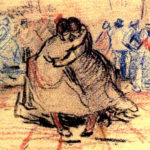We run our website the way we wished the whole internet worked: we provide high quality original content with no ads. We are funded solely by your direct support. Please consider supporting this project.

Revolting Against Classism
All fallen societies and religions have a tendency to rank people according to class. All have ways of separating the insiders from the outsiders, the holy from the unholy and the more important people from the less important people. Jesus revolted against classism by the way he lived, a way defined by the Kingdom.
Now, neither Jesus nor any New Testament author provided us with instructions on how to fix the destructive classism of society as a whole in a political way. There have been many theologians who have tried to enlist Jesus and the New Testament in support of Marxism or Socialism, but they are as misguided as those who try to enlist the Bible in support of Capitalism or Libertarianism. The Kingdom is not of this world, and it’s vital we honor this fact by keeping the Kingdom holy.
Rather than trying to fix the world by tweaking Caesar’s program, Jesus revolted against classism by establishing a counter-cultural tribe who manifests the beauty of a people who are free of class as they relate to each other the way God relates to them. As in all matters, the way this tribe is to transform society as a whole is by providing it with a beautiful alternative that exposes the ugliness of class while revolting against the principalities and powers that inspire it.
This beautiful alternative was embodied in the way that Jesus treated those enslaved to classism in first-century Jewish culture. For instance, disabled people were seen as being cursed by God and were often treated as misfits and outcasts. Lepers were viewed as unclean an untouchable. Condemned criminals and impoverished people were generally looked down upon as scumbags. Certain kinds of sinners were deemed an untouchable class. And women were, on the whole, considered second-class citizens and were generally viewed as property owned by men.
Jesus revolted against classism by touching lepers, healing the sick, treating beggars as equals, treating women with respect, identifying with the poor, and befriending those judged as the worst of sinners.
Jesus revolted against every social judgment that separated people into classes and revolted against the powers that fuel it.
The revolution of Jesus calls the church to manifest the truth that the typical way that people are judged by a class system has been completely abolished. The Kingdom of God has a center—Jesus Christ—and he demonstrated that there are no walls composed of class distinctions that should divide us. This is a beautiful alternative.
Whether people are “normal” by social standards, upper class or lower class, intelligent or cognitively-challenged, educated or uneducated, attractive or unattractive, decent or indecent, able-bodied or disabled, male or female, talented or untalented, famous or unknown, young or old—our primary job is to manifest the truth that each and every one of us has unsurpassable worth, just as Jesus did. And we manifest this truth by how we welcome and embrace people, just as they are.
Photo credit: holacomovai via Visualhunt.com / CC BY-NC
Category: General
Tags: Jesus, Kingdom Living, Kingdom Revolution, Love
Topics: Ethical, Cultural and Political Issues
Related Reading

Love Never Stops
Greg reflects here that he can be a very cynical person if you ask him about the state of the world around us, but the love of God demonstrated in the Easter narrative gives him confidence and hope. We hope this blesses you as you move through holy week. You can find more videos like this…

What Does It Mean to Be Married to Christ?
The New Testament calls Christ the “bridegroom” and the church his “bride.” To understand what this means can change your life. We need to read this through the lens of first century Jewish marriage. In what follows we’ll highlight six aspects of first century Jewish marriages to see how each sheds light on the New…

The Cruciform Beauty of Horrific Divine Portraits
“Only a person who is aware of the crucified Christ can properly understand Scripture.” Luther (Table Talks) In the last three posts I’ve been wrestling with how insights from Matthew Bate’s book, The Hermeneutics of the Apostolic Proclamation might help us interpret violent portraits of God in the OT in a way that discloses how…

Kingdom Revolution
To properly understand an action, you need to interpret it in the light of the social context in which it takes place. For example, if we were to hear about a white male offering his seat at the front of a bus to an African American woman, we would probably interpret this as a nice…

Is God Immutable? Part I
For a number of reasons, Plato believed that something changes only to become better or to become worse (Rep. II). Since a perfect being can’t be improved or diminished, he argued, God must be completely unchanging, As this idea was developed over time, Plato’s followers concluded that not only must God’s character be unchanging, but…

Living Jesus’ Prayer for Forgiveness
Luke 23:34: Jesus said, “Father, forgive them, for they do not know what they are doing.” Could anything be more shocking and yet more beautiful than this prayer? After being whipped, beaten, crowned with thorns, repeatedly mocked, spit upon, sneered at, and pierced with spikes through his wrists and ankles, while slowly suffocating as he…
